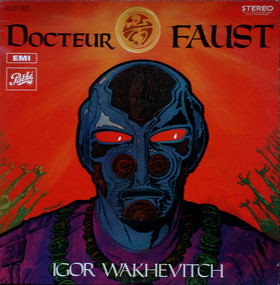I prefer to wait until I have enough time to write an adequate review of an album before I post it here on DM; however, I don't have much time on my hands due to work and school. There are a few amazing albums that I would really like to share with you all, despite the fact that I don't have time to write reviews for them. The first is an album by Igor Wakhévitch, an electronic avant-garde composer from France. I downloaded this from a now defunct blog a couple of years ago, and I've been meaning to share this one for a while. This is far and away my favorite album by Wakhévitch, mostly because there is a higher degree of fun experimentation, as well as an eclectic approach, which can't be matched by his other albums. Here is some more information about Wakhévitch courtesy of Wikipedia, along with a few reviews which will give you a better idea of what to expect from this marvelous album:
Wikipedia:Igor Wakhévitch (born May 12, 1948, Provence, France), son of the art director Georges Wakhévitch, is an avant-garde French composer who released a series of studio albums in the 1970s and composed the music for the Salvador Dalí opera Être Dieu. He was a contemporary of similar avant-garde electronic composers, such as Pierre Henry, who was also born and based in Paris.
Although Wakhévitch is a relatively unknown composer, he gained a small cult following in the late 1990s after praise circulated by Nurse with Wound (on the list of influences in their first album, from 1979), Michael Gira of Swans and a review of one of his studio albums by Dominique Leone for a feature entitled "It Was the Strangest Record I Had Ever Heard" on Pitchfork Media.
From the age of eight, Wakhévitch learned to play piano under the tutelage of Louise Clavius-Marius and Lucette Descaves. Between the ages of 12 to 17, he studied at the Conservatoire de Paris. During this time, he was auditioned by Herbert von Karajan for a concert at the Théâtre des Champs-Élysées, and in 1965 he won the Jury's First Prize for Piano by a unanimous vote. In 1967, studying under Olivier Messiaen, Wakhévitch won the first prize in Musical Analysis. In 1968, he worked for the GRM in the Office de Radiodiffusion-Télévision Française, under the direction of Pierre Schaeffer.
Review by John Coulthart:This is the most obscure album of the lot. I’d never hit it before this release. Aptly in tune with the title, it is also one of the strangest. Docteur Faust was created for a festival in Avignon, and was later choreographed. Though, the mind boggles as to how anyone could dance to this. “Full of fury and energy” to quote a reviewer at the Avignon festival, it certainly is!
On one hand this is a more balanced blending of classical and dramatic musics, yet also it is much more extreme. There’s a wealth of sonic collage, dense musique-concrète, and bizarre musics that collide and fragment against rock structures. There’s also moments of pure classical avant-garde moving into ensemble pieces feeling like Henze meets Ligeti or Xenakis. The use of electronics is really vivid too. There are no rules or boundaries in what makes up a Wakhévitch composition! The rock elements return throughout this album and, although not credited, I would guess that again Triangle members are featured. The guitar reminds of Alain Renaud, and percussion is quite distinctive, backed-up with weirdly treated organ. Although a short album, it is so engrossing and weird that it would be too-much if it were much longer.
Review from Astral Injections (Now Defunct Blog) On Docteur Faust you will hear a very eclectic approach to music. Strange electronic effects, choir-like vocal arrangements, snippets of orchestral music, and rock music are combined with fragments of musique-concrete like the voice of (most likely) the pope, and on top the sound of a whip, a spoken voice reciting over weird electronic sounds, gun fire, a neighing horse, etc.
Year of Release: 1971
Country of Origin: France
Label: Pathé
Genre: Electronic, Avant-Garde, Experimental
Bitrate: 224kbps
Track List:1. Aimantation
2. Materia Prima
3. Eau Ardente
4. Tenebres (Walpurgis)
5. Licornes
6. Sang Pourpe
The album with the improved bitrate is now up. Thank you for your patience.









